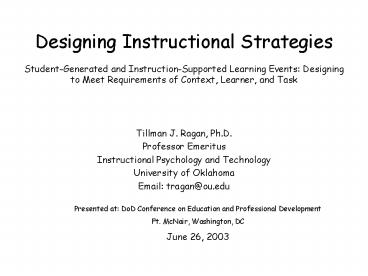Designing Instructional Strategies PowerPoint PPT Presentation
1 / 30
Title: Designing Instructional Strategies
1
Designing Instructional Strategies
Student-Generated and Instruction-Supported
Learning Events Designing to Meet Requirements
of Context, Learner, and Task
- Tillman J. Ragan, Ph.D.
- Professor Emeritus
- Instructional Psychology and Technology
- University of Oklahoma
- Email tragan_at_ou.edu
Presented at DoD Conference on Education and
Professional Development Ft. McNair, Washington,
DC June 26, 2003
2
Background
3
Designing Instructional Strategies -- What?
- In 1960s Air University terms
- How Do We Select Instructional Approach
- Updated terms
- How Do We Design Instructional Strategies?
4
Why Is Strategy Design Important?
- Quality Instruction
- New Technologies
- Elevate Argument to Problem Solving
5
The Problem
- How best to foster learning
Key Elements
Context Learners Learning Task
6
Central Question in Design of Instructional
Strategies
Where should the primary load of information
processing be?
Supplied by the instruction
Generated by the learner
Or somewhere in between?
Relatively Generative
Relatively Supplantive
7
Generative and Supplantive Strategy Alternatives
- For a lesson or unit in general?
- For particular events?
- e.g. Summary
- e.g. Information and Examples
- e.g. Learning Strategies
8
Black Brown Red Orange Yellow Green Blue Violet
Grey White
B B R O Y G B V G W 0 1 2 3 4 5 6 7 8 9
Big Bad Roy G. BiV, Great Westerner
Roy G. BiV
9
Expanded Events of Instruction
Body - Prior Knowledge - Info Examples -
Focus Attention - Learning Strats -
Practice - Feedback
Introduction - Attention - Purpose -
Interest - Preview
Conclusion - Summarizing - Transfer -
Close Assessment - Assess Learning - Feedback
Smith Ragan, 1999
10
Generative Event
Supplanted Event
Activate Attention to Lesson Establish
Purpose Arouse Interest Motivation Preview
Learning Activity Recall Relevant Prior
Knowledge Process Information Examples Focus
Attention Employ Learning Strategies Practice Eval
uate Feedback Summarize and Review Transfer
Learning Remotivate and Close Assess
Learning Evaluate Feedback
Gain Attention to Lesson Inform Learner of Inst.
Purpose Stimulate Learners Attn Motiv. Provide
Overview Stimulate Recall of Prior
Knowledge Present Information Examples Gain and
Direct Attention Guide or prompt use of Lng.
Strats. Provide for and Guide Practice Provide
Feedback Provide Summary and Review Enhance
Transfer Provide Remotivation and Closure Conduct
Assessment Provide Feedback and Remediation
11
Cognitive Load of Information Processing
On the Learner
On the Instruction
Generative
Supplantive
12
Some Factors that Influence Cognitive Load
Context Factors Learner Factors
Task Factors
- Time
- Goal Priority
- Accountabililty
- Prior Knowledge
- Aptitude
- Motivation
- Anxiety
- Avail. Cog. Strats.
- Complexity
- Criticality / Hazard
- Performance Level
13
How Factors Affect Strategy Decisions
For example, Time
Generative strategies take longer
14
How Factors Affect Strategy Decisions
For example, Time
Generative strategies take longer
Situation A Lots of Time Available
G
S
15
How Factors Affect Strategy Decisions
For example, Time
Generative strategies take longer
Situation B Little Time Available
G
S
16
How Factors Affect Strategy Decisions
For example, Prior Knowledge
More prior knowledge decreases load
G
S
17
How Factors Affect Strategy Decisions
For example, Prior Knowledge
More prior knowledge decreases load
Situation A Learners have lots of prior knowl.
G
S
18
How Factors Affect Strategy Decisions
For example, Prior Knowledge
More prior knowledge decreases load
Situation B Learners are beginners
G
S
19
Some Examples
20
Example 1 Command and Staff CollegePrinciples
of Supervision
Relatively Generative Strategy Appropriate
Context Time not critical Learners Prior
learning/ experience Task Not hazardous
21
Example 2 Wiz Tech Corp.Maint. Tech. Hard
Drive Service Training
Moderately Supplantive Approach Recommended
Context Very little time avail. Task
High Skill Level Needed
Learners High Prior Knowledge
22
Example 3 Ft. Benning, Ranger SchoolPacking
Your Parachute
Context Very little time High
accountability Learners High anxiety Task
Critical - Hazardous
Highly Supplantive Approach Suggested
23
Example 4 11th Grade Social StudiesCauses of
the VietNam War
Highly Generative Strategy Appropriate
Context Plenty of time Goal
priority Learners Low Anxiety Diverse
Backgrounds Task Not critical No right answer
24
Example 4-A War CollegeCauses of the VietNam
War
Moderately Supplantive Approach Appropriate?
Context Goal Priority Accountability Task
Critical
25
Two Overall PrinciplesSmith Ragan, 1999
- As generative as possible
- May move from supplantive to generative
26
Summary
- Designing Instructional Strategies
- Key Question
- Locus of information processing
- Generative and Supplantive approaches
- Factors that Influence What Will Work
- Two general principles
27
References
- Mayer, R.E. Moreno, R. (2003). Nine ways to
reduce cognitive load in multimedia learning.
Educational Psychologist, 38 (1), 43-52. - Renkl, A. Atkinson, R. K. (2003). Structuring
the transition from example study to problem
solving in cognitive skill acquisition A
cognitive load perspective. Educational
Psychologist, 38 (1), 15-22. - Salomon, G. (1979). The interaction of media,
cognition, and learning. San Francisco
Jossey-Bass - Smith, P.L. Ragan, T.J. (1999). Instructional
design, 2nd Edition. Hoboken,NJ Wiley. ISBN
0-471-36570-X. Learning Resources Web site
http//www.ou.edu/education/edpsy/iptwww/instdsgn/
mainframeset.htm - Wittrock,M.C. (1974). Learning as a generative
process. Educational Psychologist, 11, 87-95.
28
Questions?
29
Load-Reduction Methods (Mayer Moreno, 2003)
- Off-loading
- Segmenting
- Pre-training
- Weeding
- Signaling
Aligning Eliminating Redundancy
Synchronizing Individualizing
30
(No Transcript)

